Overview
Aim
- Theoretical underpinning
- Discussion and practical exercises
- Case studies
- Certified Results
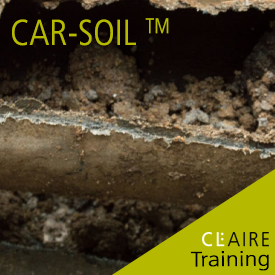 Full day CAR-SOIL for professionals working on and in asbestos-contaminated land (8hours).
Full day CAR-SOIL for professionals working on and in asbestos-contaminated land (8hours).
Course Objectives and Learning Outcomes:
A one day course that will explain in detail the requirements of CAR 2012, HSE ACoP and guidance L143, in the context of the new guidance set out in CAR-SOIL for persons working on sites with soil and/or C&D materials contaminated with asbestos.
To provide a detailed overview of the requirements of CAR 2012, HSE ACoP and guidance L143 and CAR-SOIL in the application of CAR 2012 for sites with soil and/or C&D materials contaminated with asbestos. The course will also provide an insight how these key differences were developed in conjunction with HSE. This course is an essential introductory learning package for environmental and construction professionals engaged on investigating, assessing, remediating and developing sites that are contaminated with asbestos. The course may also be applicable to waste management professionals engaged in recycling C&D materials that may be contaminated with asbestos.
Who should attend the course:
Professionals working on and in asbestos-contaminated land: environmental consultants, asbestos management consultants, remediation contractors, asbestos removal contractors, construction/development, regulators.
About the Trainer:
Steve Forster
Stephen Forster has over 33 years' experience in all aspects of the investigation, assessment and management of asbestos and contaminated land in various roles. He has developed broad-ranging practical experience and expertise in the fields of both asbestos in buildings management and investigation and assessment of asbestos-contaminated land, recycled C&D materials and wastes.
He is Chair of the Joint Industry Working Group on Asbestos in Soil and Construction & Demolition Material and was the author of the industry guidance interpreting the Control of Asbestos Regulations 2012 for application in the assessment of land contaminated by asbestos – CAR-SOIL (CL:AIRE, 2016), developed in conjunction with the Health & Safety Executive.
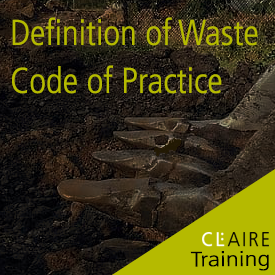 The DoW CoP provides a clear, consistent and efficient process which enables the reuse of excavated materials on-site or their movement between sites.
The DoW CoP provides a clear, consistent and efficient process which enables the reuse of excavated materials on-site or their movement between sites.
Use of the DoW CoP supports the sustainable and cost effective development of land. It can provide an alternative to Environmental Permits or Waste Exemptions.
The DoW CoP enables:
- the direct transfer and reuse of clean naturally occurring soil materials between sites
- the conditions to support the establishment/operation of fixed soil treatment facilities
- the reuse of both contaminated/uncontaminated materials on their site of origin and between sites within defined Cluster projects
Click here to register yourself or someone else for DoW CoP Training.
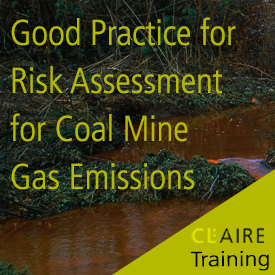 Course Objectives and Learning Outcomes:
Course Objectives and Learning Outcomes:
This course will explain the practical application of the recent CLAIRE guidance on risk assessment for coal mine gas emissions, which was published in 2021.
- On completion of the course delegates should have a good understanding of:
- The different gas hazards that can affect development over old coal mines;
- The influence on mining methods on gas risk;
- The sources of gas in old coal mines;
- The factors that can influence mine gas emissions;
- The mine gas risk assessment process;
- How to deal with future changes and uncertainties within the risk assessment.
Who should attend this course:
Geo-environmental engineers, developers, local authorities.
About the Trainer:
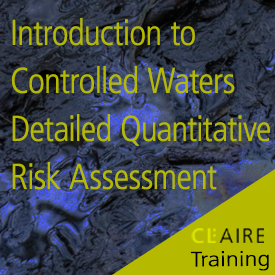 Course Description & Learning Outcomes:
Course Description & Learning Outcomes:
This full day hands-on course provides participants with an introduction to Controlled Waters Detailed Quantitative Risk Assessment (DQRA). The course will be taught through a series of lectures interspersed with practical hand-on sessions using the Environment Agency’s RTM model. Delegates will learn about:
- The UK regulatory context relevant to Controlled Waters DQRA
- Methods/tools for Controlled Waters DQRA and how to choose which are most appropriate for the site being assessed
- Principles of contaminant fate and transport modelling in groundwater
- Data requirements for groundwater DQRA
- Forward versus reverse modelling to assess risks to Controlled Waters receptors
- How to derive site specific assessment criteria for soil and groundwater that are protective of Controlled Waters receptors
- Assessing uncertainty and risk evaluation
Each course is restricted to 10 delegates to ensure good trainer to delegate ratio for the practical work. Delegates should bring their own laptops with the RTM model v3.2 downloaded (see https://www.gov.uk/government/publications/remedial-targets-worksheet-v22a-user-manual ) with the Excel Add-Ins “Analysis ToolPak” and “Analysis ToolPak VBA” enabled.
A certificate of attendance will be provided on completion of attendance.
Who should attend this course:
Geoenvironmental consultants, remediation contractors, contaminated land officers/regulators.
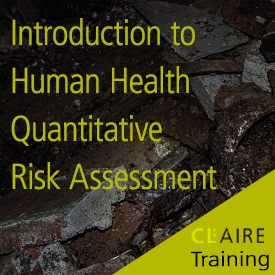 Course Description & Learning Outcomes:
Course Description & Learning Outcomes:
This full day hands-on course provides participants with an introduction to Human Health Quantitative Risk Assessment. The course will be taught through a series of lectures interspersed with practical hand-on sessions using the Environment Agency’s CLEA model. Delegates will learn about:
- The principles behind human health quantitative risk assessment
- What the CLEA model is and does
- How to derive generic assessment criteria (including C4SL) using CLEA
- How the different pathways in CLEA are modelled and key assumptions
- How to use CLEA in Advanced Model for conducting detailed quantitative risk assessments
- Bioavailability and bioaccessibility - how to address using CLEA
- Health based guidance values and an introduction to human health toxicology
Each course is restricted to 10 delegates to ensure good trainer to delegate ratio for the practical work. Delegates are required to bring their own laptops preloaded with the CLEA software version 1.071 (available from https://www.gov.uk/government/publications/contaminated-land-exposure-assessment-clea-tool). .
A certificate of attendance will be provided on completion of attendance.
Who should attend this course:
Geoenvironmental consultants, remediation contractors, contaminated land officers/regulators.
About the Trainer:
Simon Firth is an independent consultant with more than 25 years experience working on land contamination projects in the UK and worldwide. Over that time he has developed significant expertise in human health and environmental risk assessment. Simon is an experienced and enthusiastic trainer and has in depth knowledge of the CLEA model. He has been instrumental in the development of UK generic soil and groundwater screening values derived using CLEA including the CL:AIRE/EIC/AGS GAC, the Defra C4SL and the SoBRA groundwater vapour GAC.
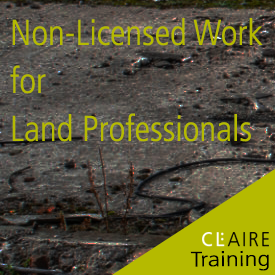 Full day Non-Licensable Work (NLW), including Notifiable Non-Licensable Work (NNLW), inclusive of practical training, for professionals working on and in asbestos-contaminated land (7 hours plus 45 minute exam).
Full day Non-Licensable Work (NLW), including Notifiable Non-Licensable Work (NNLW), inclusive of practical training, for professionals working on and in asbestos-contaminated land (7 hours plus 45 minute exam).
Course Objectives and Learning Outcomes:
A 1 day course that will provide delegates with the knowledge, understanding and skills to undertake work in ground and C&D materials that are contaminated with asbestos, which may be classed as NLW. Successful completion of the course will allow competent persons to undertake this work in accordance with Regulation 10 of CAR 2012 and CAR-SOIL.
The Non-Licensable Work (NLW) with asbestos, including Notifiable Non-Licensable Work (NNLW), training covers the following:
• how to make suitable and sufficient assessments about the risk of exposure to asbestos in the ground
• safe work practices and control measures, including an explanation of the correct use of control measures, protective equipment and work methods
• selection and appropriate use of protective equipment
• waste handling procedures
• emergency procedures
• relevant legal requirements
• circumstances when non-licensed work may be notifiable (i.e. NNLW)
Attainment of the learning outcome for the NLW qualification will be assessed by a multiple choice examination consisting of 30 questions under exam conditions.
Candidates will be required to achieve a score of at least 23 out of 30 (77%) in the examination. Failure to achieve this will result in the candidate being required to re-take the examination under exam conditions on the same day. If a candidate further fails the second attempt then they will be required to re-sit the course in its entirety.
Who should attend the course:
Professionals working on and in asbestos-contaminated land: environmental consultants, ground investigation workers, remediation contractors, construction/development, waste processing and recycling plant operators, regulators.
**IMPORTANT BEFORE BOOKING**
All delegates MUST be able to demonstrate that they have attended an Asbestos Awareness training course which satisfied the requirements of Regulation 10 of the Control of Asbestos Regulations 2012 and the supporting Approved Code of Practice L143 "Managing and working with asbestos", and achieved an examination pass mark.
Whilst demonstration of passing a standard Asbestos Awareness course is acceptable, candidates may benefit from taking the Asbestos Awareness for Soil course, as this will better prepare you for some of the specific issues that arise with asbestos in soils and construction and demolition materials when taking the NLW for soils course.
The Asbestos Awareness training course may have been delivered online or face-to-face and may be evidenced by means of a certificate and/or a signed and authenticated copy of the individual's formal Training Record. If the Asbestos Awareness training course has been taken more than 12 months prior to booking on this NLW course, the certificate and/or Training Record must be accompanied by documented and verifiable refresher training that has been delivered to the candidate in the last 12 months.
If you do not have this evidence or have not already attended an Asbestos Awareness Course please contact the Help Desk.
Course Programme
Duration 7 hours (contact time)
Registration, Tea/coffee and informal networking with tutors 8.15-8.45am
Lunch (provided) and informal networking with tutors
Exam Review/close out with tutors 17.15pm - 17.30pm
About the Trainer:
Steve Forster
Stephen Forster has over 33 years' experience in all aspects of the investigation, assessment and management of asbestos and contaminated land in various roles. He has developed broad-ranging practical experience and expertise in the fields of both asbestos in buildings management and investigation and assessment of asbestos-contaminated land, recycled C&D materials and wastes.
He is Chair of the Joint Industry Working Group on Asbestos in Soil and Construction & Demolition Material and was the author of the industry guidance interpreting the Control of Asbestos Regulations 2012 for application in the assessment of land contaminated by asbestos – CAR-SOIL (CL:AIRE, 2016), developed in conjunction with the Health & Safety Executive.
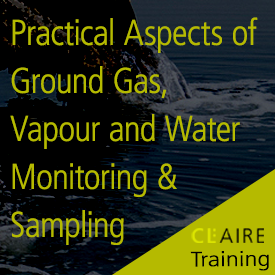
Course Objectives and Learning Outcomes:
This full day course will provide participants with an overview in the following: -
- Introduction and understanding the role of monitoring & sampling within the overall scope of works including Conceptual Site Model, Safety, Health, Environment and Quality.
- “How to” perform gas and vapour monitoring & sampling.
- “How to” perform water monitoring & sampling.
- The role of supporting suppliers, record keeping and the “dark arts”.
Who should attend this course?
The course is ideal for Early Career Practitioners including geo-environmental consultants, remediation contractors and contaminated land regulators who have a knowledge of ground gas, vapour and water monitoring & sampling which they wish to develop or those more experienced practitioners wishing to refresh their skills.
Course Prerequisites
Delegates should bring their experiences and questions as the day will be interactive, but a questionnaire will be distributed for completion prior to the course.
Example equipment will be available on the day, but delegates can bring their own equipment if they wish.
About the trainer
Paul Brennan is an independent Contaminated Land practitioner with over 30 year’s experience in the site investigation, remediation and waste management industries. Initially working for an independent contaminated land laboratory before setting up Environmental Monitoring & Sampling Services Limited (EMSS Ltd) in 2006.
EMSS Ltd provides the following services: environmental monitoring & sampling, collection of factual data, laboratory liaison, walkover surveys, project management and on-site supervision & management during site investigation, remediation and demolition contracts.
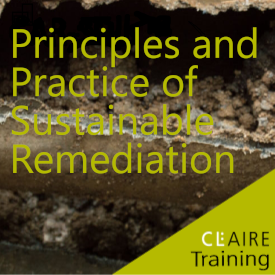 This full day course will provide participants with an overview in the following: -
This full day course will provide participants with an overview in the following: -
Sustainable Remediation Hands on Training Course:
The proposed training will be aimed at entry level or early-years professionals and those wishing to gain a fundamental understanding of the principles and practice of Sustainable Remediation.
Course Description & Learning Outcomes:
This full day hands-on course will provide participants with an introduction to the principles and practice of sustainable remediation. The course will be taught through a series of lectures interspersed with examples and practical hand-on sessions using a case study to give attendees first-hand experience of applying the principles of sustainable remediation through the life cycle of a project. Attendees will conduct their own sustainability appraisal of a hypothetical site where they will learn about setting project boundaries, defining sustainability indicators, undertaking a sustainability appraisal and implementing sustainable management practices. To make the most of the day attendees will be provided with pre-read materials in advance of the course.
- The UK regulatory context relevant to Sustainable Remediation
- The SURF UK framework
- Selection of sustainability Indicators
- Undertaking a Tier 1 qualitative sustainability assessment
- An Introduction to Multi Criteria Analysis
- The role of life cycle assessment and carbon footprinting in sustainable remediation
- Sustainable Remediation Practices
- Climate change & Resiliency
Who should attend this course:
- Geoenvironmental consultants,
- Remediation contractors,
- Contaminated land officers/regulators
Course Prerequisites:
All delegates are asked to briefly read through the Surf UK framework before attending the training course and delegates will also be sent some brief prereading materials to help prepare for the exercises in the course.
About the trainer:
The training course will be facilitated and delivered by Dr Alan Thomas Technical Partner based in Oxford UK and current co Chair of SuRF UK. Alan is a chartered biologist and SILC. Alan has over 30years in the management and remediation of contaminated sites in UK and Internationally with an emphasis on investigation and innovative and sustainable remediation of recalcitrant compounds. Global lead for remediation management technical community and sustainable remediation. Core expertise in promoting investigation and remediation around an understanding chemistry and microbiology of contaminated environments with an emphasis on contaminant fate, transport and behaviour. Alan has contributed to recent guidance on LNAPL and Monitored Natural Attenuation as well as SuRF UK documents on Sustainable Management Practices and Resiliency.
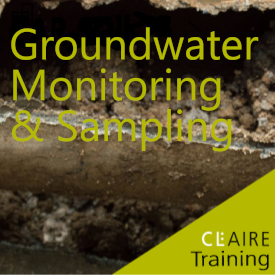
Course Objectives and Learning Outcomes:
This full day course will provide participants with an overview in the following: -
- Introduction and understanding the role of monitoring & sampling within the overall scope of works including Standards, Conceptual Site Model, Safety, Health, Environment and Quality.
- Representative Samples.
- Development & Well Purging Strategies.
- Monitoring & Sampling Techniques.
- The role of supporting suppliers, record keeping and the “dark arts”.
Who should attend this course:
- The course is ideal for Early Career Practitioners including geo-environmental consultants, remediation contractors and contaminated land regulators who have a knowledge of water monitoring & sampling which they wish to develop or those more experienced practitioners wishing to refresh their skills.
Course Prerequisites:
Delegates should bring their experiences and questions as the day will be interactive, but a questionnaire will be distributed for completion prior to the course. Example equipment will be available on the day, but delegates can bring their own equipment if they wish.
About the trainer:
Paul Brennan is an independent Contaminated Land practitioner with over 30 year’s experience in the site investigation, remediation and waste management industries. Initially working for an independent contaminated land laboratory before setting up Environmental Monitoring & Sampling Services Limited (EMSS Ltd) in 2006. EMSS Ltd provides the following services: environmental monitoring & sampling, collection of factual data, laboratory liaison, walkover surveys, project management and on-site supervision & management during site investigation, remediation and demolition contracts.
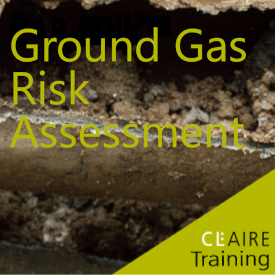
Course Description and Learning Outcomes:
This training course will help ground gas risk assessors understand the risk assessment process for ground gas and how it is important to look beyond gas monitoring data to asses risk using a multiple lines of evidence approach. The course will be based on the recent guidance on ground gas risk assessment published by the NHBC Foundation (NF94, Hazardous Ground Gases – an essential guide for housebuilders) and ASTM (E2993-16 Standard Guide for Evaluating Potential Hazard as a Result of Methane in the Vadose Zone). You will gain an understanding of the key points in documents direct from the authors. At the end of the training you should understand the how a good preliminary risk assessment can determine whether or not gas monitoring is required; the key elements of a good ground investigation design to avoid problems with results later on; and how good risk assessment using multiple lines of evidence can reduce risk of remove the need for gas protection. It will explain how more advanced methods such ternary plots of gas data and modelling gas flow can provide important and useful lines of evidence. It will also explain how the use of continuous monitoring and more advanced screening methods such as those in Ground Engineering 2019 (Risk and Reliability in Gas Protection Design – 20 years on: Parts 1 and 2 The course will include many examples from real sites. Unique course content and if there is one training course you attend on ground gas this should be it.
Requirements of Delegates ahead of Training Course:
All delegates are asked to briefly read through NHBC Foundation Report NF94 before attending the training course
Who Should Attend:
Site investigation contractors, environmental monitoring companies, geo-environmental consultants.
About the trainer:
Amy Juden
Amy is Head of Geoenvironmental at EPG. She is a chartered geologist and contaminated land specialist with over ten years’ experience in the brownfield redevelopment industry. Amy has specialist skills in site conceptualisation, geoenvironmental ground investigation, and contaminated land risk assessments. Amy is a specialist in ground gas risk assessment, she delivers training for the Geological Society on methane and radon ground gas geohazards and is one of the authors of NHBC Foundation Publication N94. Amy served three years as a judge for the Brownfield Awards and is also a committee member for the Yorkshire Contaminated Land Forum.
Steve Wilson
Steve is a recognised international expert on ground gas. He is a Chartered Civil Engineer and a UK Registered Ground Engineering Adviser (ROGEP). He is also a Society for Brownfield Risk Assessment Accredited Risk Assessor (ASoBRA) for ground gas and vapour intrusion and a CL:AIRE accredited Specialist in Gas Protection Verification (SGPV). He has 30 years experience of assessing ground gas and VOC risk and design of mitigation schemes for developments. This includes assessment of gas and VOCs from sources such as various types of landfill sites, coal mines and oil and gas wells. He has contributed to British Standards on ground gas assessment and design for developments and also NHBC, CIRIA and CL:AIRE reports (bodies recognised for producing independent industry guidance on ground gas for developments) including NHBC Foundation Publication N94 and CIRIA C801 and was on the drafting committee for the 2023 revision of ASTM E2993-16 Standard Guide for Evaluating Potential Hazard as a Result of Methane in the Vadose Zone.

Course Description and Learning Outcomes:
The new statistical guidance from CL:AIRE “Comparing soil contamination data with a critical concentration” was published in September 2020 and introduces land contamination professionals to a different way of drawing conclusions from soil contamination data. In this course, you will learn the fundamentals of statistical concepts & thinking and how to use the recommended statistical tools to draw conclusions. There will be ample opportunities to take part in stimulating discussions and apply what you learn to real life case studies. In addition, there will be examples to show you how the relevant calculations can be undertaken in Microsoft Excel.
The morning will focus on the statistical concepts and calculations needed to use the recommended statistical tools:
- An overview of the 6 concepts of statistical thinking i.e. likelihood, risk, expectation, variance, distribution and correlation;
- How to produce (in Microsoft Excel) and interpret histograms, dot plots and box plots;
- How to calculate and interpret confidence intervals; starting
- How to draw conclusions from your data.
The afternoon will begin with further discussion of some real life case studies and then go into more depth about the statistical principles that underlie the guidance and how you can use these to take your statistical analysis to the next level:
- What is the Central Limit Theorem and what are its strengths and weaknesses;
- Alternative methods of calculating confidence intervals;
- What are Data Types and how to use them to decide if your sample size is sufficient;
- How to plot and detect spatial correlation in your data;
Who Should Attend:
The course aims to help all land contamination professionals who need to make decisions based on soil contamination data. This is a must have course for all those who need to be fully conversant with the key statistical tools before undertaking such comparisons with a critical concentration.
- Familiarity with soil contamination data;
- A copy of the CL:AIRE guidance “Comparing soil contamination data to a critical concentration”;
- A laptop with Microsoft Excel installed. A spreadsheet with the data to be analysed during the course will be emailed to you before the course;
- Completion of an online questionnaire before the course. A link to the questionnaire will be emailed to about 2 weeks before the course;
About the trainer:
Nigel Marriott is an Independent Statistician and fellow of the Royal Statistical Society. He has been running statistics courses aimed at non-statisticians for over 20 years. Feedback has consistently noted that Nigel has a rare ability to explain what looks like complicated statistics in a simple manner that makes it easy for you to understand and apply what you are learning.
Nigel blogs extensively on topical statistical issues and you can find all his blogs here.
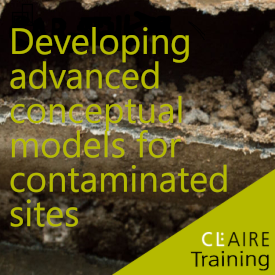
Developing advanced conceptual models for contaminated sites
Course description & learning outcomes
Monitored Natural Attenuation (MNA) and Natural Source Zone Depletion (NSZD) are concepts receiving increasing attention in the UK as stakeholders seek sustainable ways to remediate contaminated sites while meeting key performance indicators. These terms describe the assessment of natural attenuation in source zones and groundwater plumes and its application to the evaluation and remediation of contaminated sites, that are captured in technical guidance published by CL:AIRE. Because assessing MNA and NSZD are founded upon evolution and refinement of an advanced CSM, they can be used to support many kinds of decisions about sustainable site management including risk assessment, options appraisal, stand-alone risk management or transition from active to passive remediation and verification.
This course is Day 1 in a two-part series that aims to provide critical awareness and understanding for industry practitioners, consultants and regulators to develop and review advanced conceptual site models that are required to inform sustainable approaches to risk management and remediation at contaminated sites. Sessions will cover the following topics:
- Conceptual modelling in the contaminated site lifecycle, including
- Objective-based data collection (DQO), value of information, data gaps and uncertainty
- Role of data visualisation and modelling
- Communicating conceptual site models
- Conceptualising geological and hydrogeological data for different environments
- Evaluating contaminant mass and phase distribution, transport mechanisms and natural attenuation
- Assessing complex contaminant linkages involving non-aqueous phase liquids, gas- vapour- and dissolved phase plumes
- Evaluating potential effects of plausible future conditions on contaminant transport and risk, including climate change.
The sessions will be interactive and offer a range of opportunities for participation.
Prerequisites
Delegates should be familiar with principles of contaminant hydrogeology, site characterisation technologies, LCRM and UK risk-based procedures. A brief read through the CL:AIRE MNA and NSZD technical guidance documents would also be beneficial.
Who Should Attend
Industry practitioners, geoenvironmental consultants and regulators involved in the evaluation and remediation of contaminated sites.
Trainers
James Rayner is a Principal at Geosyntec Consultants who specialises in developing advanced conceptual site models to support management of land contamination in challenging environments. He has expertise with pioneering data analysis and modelling techniques to assess contaminant fate and transport, and to appraise the feasibility and performance of monitored natural attenuation (MNA), natural source zone depletion (NSZD) and remedial alternatives, and has published technical guidance on these topics with CL:AIRE.
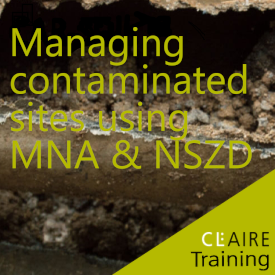
Managing contaminated sites using MNA & NSZD
*** Please be aware that attendance in this course requires prior completion of the Developing Advanced Conceptual Models for Contaminated Sites course.
Course description & learning outcomes
Monitored Natural Attenuation (MNA) and Natural Source Zone Depletion (NSZD) are concepts receiving increasing attention in the UK as stakeholders seek sustainable ways to remediate contaminated sites while meeting key performance indicators. These terms describe the assessment of natural attenuation in source zones and groundwater plumes and its application to the evaluation and remediation of contaminated sites, that are captured in technical guidance published by CL:AIRE.
This course is Day 2 in a two-part series that aims advance knowledge and provide practical advice to assess the efficacy of natural attenuation, evaluating MNA or NSZD as a standalone, parallel or transitional option compared to remediation alternatives, and implementing monitoring-based risk management programmes. Sessions will cover the following topics:
- Decision making processes to assess MNA or NSZD viability, including transition assessment
- Multiple lines of evidence approach, including methods of assessment and predictive modelling
- Application of advanced methods to assess degradative processes
- Compound specific isotope analysis (CSIA) and related techniques
- Molecular biological tools (MBTs)
- Characterising NSZD and monitoring approaches
- Estimating NSZD rates
- Performance monitoring strategies to close corrective actions.
The sessions will be interactive and offer a range of opportunities for participation.
Prerequisites
Delegates should be familiar with principles of contaminant hydrogeology, MNA and NSZD. A brief read through the CL:AIRE MNA and NSZD technical guidance documents will be beneficial.
Who Should Attend
Industry practitioners, geoenvironmental consultants and regulators involved in the evaluation and remediation of contaminated sites.
Trainers
James Rayner is a Principal at Geosyntec Consultants who specialises in developing advanced conceptual site models to support management of land contamination in challenging environments. He has expertise with pioneering data analysis and modelling techniques to assess contaminant fate and transport, and to appraise the feasibility and performance of monitored natural attenuation (MNA), natural source zone depletion (NSZD) and remedial alternatives, and has published technical guidance on these topics with CL:AIRE.
Kevin Kuntze is CEO of Isodetect GmbH, Germany. He received his Ph.D. in Biochemistry from the University of Leipzig (Germany) in the research field of anaerobic biodegradation of groundwater contaminants. In the past 16 years Isodetect has developed many innovative tools in the area of molecular biology and compound-specific isotope analysis: Compound-specific Stable Isotope Analysis (CSIA), Stable Isotope Probing (SIP), in situ microcosms (BACTRAPs®), laboratory microcosm studies, metabolite analysis, molecular genetic techniques (qPCR) and GC-MS screening.
Phil Dennis is a Senior Principal Scientist at SiREM in Guelph, Canada where he has worked for over 22 years. Phil currently directs molecular genetic testing services and is innovation lead for SiREM’s research and development program.
Reading
CL:AIRE Training Centre
Fountain House
2 Queens Walk
Reading RG1 7QF
